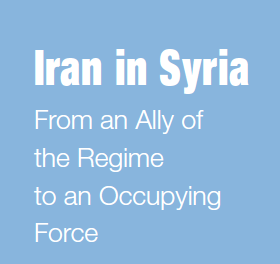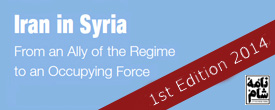Foreword
The first edition of this report, released in November 2014, was the result of a year of Naame Shaam’s work. It drew largely on information gathered from monitoring Syrian, Iranian and the international media’s coverage of events in Syria. The majority of the information and sources found in this report are thus in the public domain. The author drew on private sources only on a few occasions. This was the case, for instance, with the Syrian ‘crisis cell’ assassination story towards the end of chapter II. Even in such cases, however, the author did his best to verify and corroborate the information conveyed to him from other, publicly available sources. This second edition of the report follows the same pattern.
Readers will notice that the author has made a special effort to reference almost every piece of information mentioned in the report. This is because he wants readers to be able to verify the information and to expand on it if necessary. The references should also be useful for legal practitioners and organisations wishing to use the original sources as evidence in any future lawsuits against war criminals in Syria.
Naame Shaam has backed up and made copies of all the web pages referenced in the report, just in case they ‘disappear’, as many Iranian news reports concerning Syria have done in the past.
While drawing on a wide range of sources in a variety of languages, the author has deliberately avoided using many Syrian opposition groups and media outlets as a source, except when that was unavoidable. The reason for this is to avoid accusations of bias and unreliability.
A note on language and spelling: The author has mostly used the Iranian English spelling of names and places, even when these are originally Arabic. Thus, he uses ‘Hezbollah’ rather than ‘Hizbullah’, and ‘Sepah Qods’ rather than ‘Quds’. The reason is that numerous quotes from Iranian reports originally in English are used throughout the report, so the author opted for keeping the spelling of such words consistent as much as possible.
The author would like to thank all his Syrian, Iranian and Lebanese correspondents, colleagues and friends who provided him with the information and news that formed the core and basis of this report.
 English
English  فارسی
فارسی  العربية
العربية 

